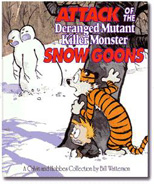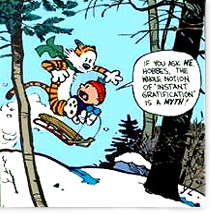Related Translation:
Thucydides' 411 B.C. History of the Peloponnesian War.
 PALO ALTO DESK - The ending of the Calvin-Hobbes comic strip gives the Republican editors the opportunity to reveal a closely guarded secret and a hidden source of the newspaper's powerful driving ethic.
PALO ALTO DESK - The ending of the Calvin-Hobbes comic strip gives the Republican editors the opportunity to reveal a closely guarded secret and a hidden source of the newspaper's powerful driving ethic.
The Daily Republican's editorial style is, in part, due to the same source as that of the hilarious comic trip's own inspiration. Bill Waterson, the creator of the cartoon may not want to admit it, but it is undeniable that the cartoon character Calvin was modeled after the Republican's 17th Century icon John Calvin(1509-64). John Calvin was a French theologian, church reformer, humanist, and pastor, whom Protestant denominations in the Reformed tradition regard as a major formulator of their beliefs.
Calvin, like his modern comic counterpart, taught an austere form of personal ethics. Many of the cartoon Calvin's antics are metaphors for those of modern political economics. Most of us get old without growing up. Inside every politician is a bratty kid who wants everything his own way.
Calvin sought to improve the life of the 17th Century French citizens in many ways. He supported good hospitals, a proper sewage system, protective rails on upper stories to keep children from falling from tall buildings, special care for the poor and infirm, and the introduction of new industries.
A resident of Strasbourg, France, Calvin married Idelette de Bure, a widow. The couple had one child, who died in infancy. At Strasbourg, Calvin also published his Commentary on Romans (1539), the first of his many commentaries on books of the Bible. In 1541 Genevans prevailed upon Calvin to return and lead them again in reforming the church. He died on May 27, 1564, and was buried in an unmarked grave in Geneva.

The Daily Republican newspaper editors use the historic Calvin and the cartoon Calvin as guides to express curiosity about the natural world. Editorial and opinion pieces think of John Calvin's teachings on human nature and political economics. While knowledge of the cartoon Calvin is often entertaining, the editor's knowledge of the historic John Calvin's precepts on civil government helps the editors of the Republican sort through today's news and understand it on a more formal level. The editors never forget that John Calvin tried to steer what he perceived to be a middle course between an exclusive emphasis on libertine irresponsibility and an exclusive emphasis on human responsibility in government and civic leadership.
A counterpart to John Calvin was Thomas
Hobbes, the 17th Century political philosopher had a dim view of
human nature.
Thomas Hobbes(1588-1679), English
philosopher and political theorist, naturalistic theories helped
him steer what he perceived to be a middle course between an exclusive
emphasis on divine right of kings to rule and an exclusive emphasis
on human responsibility for establishing a democratic form of government.
Thomas Hobbes' philosophy was a conservative reaction against the libertine conscience of the Reformation, which, he contended, brought anarchy and the end of democracy. Hobbes laid the foundations of modern scientific sociology that would establish the principles of physical science that govern the material world and gives us economics science.
 Hobbes was good-natured, intelligent, friendly, and enthusiastic. The cartoon Hobbes was very like Thomas in a sneaking-up-and-pouncing sort of way. In the comic strip there are two versions of the cartoon Hobbes. One is Hobbes, who, as a lifeless icon that miraculously comes to life whenever Calvin needs him. Another is of Hobbes as only the product of Calvin's over-active imagination.
Hobbes was good-natured, intelligent, friendly, and enthusiastic. The cartoon Hobbes was very like Thomas in a sneaking-up-and-pouncing sort of way. In the comic strip there are two versions of the cartoon Hobbes. One is Hobbes, who, as a lifeless icon that miraculously comes to life whenever Calvin needs him. Another is of Hobbes as only the product of Calvin's over-active imagination.
 Therefore, Calvin sees Hobbes one way, and everyone else sees Hobbes another way. There are two versions of reality, and each makes complete sense to the participant who sees it. Perhaps that is a good metaphor for how modern politics works. Politicians just don't see the world exactly the same way that taxpayers do.
Therefore, Calvin sees Hobbes one way, and everyone else sees Hobbes another way. There are two versions of reality, and each makes complete sense to the participant who sees it. Perhaps that is a good metaphor for how modern politics works. Politicians just don't see the world exactly the same way that taxpayers do.
In the comic strip Calvin's parents (taxpayers) don't have names. This is because as far as politicians are concerned, they are important only as faceless revenue producers.
 The comic strip is about one of John Calvin's edicts, that suffering builds character and is a paraphrase of the justification given by the U.S. Congress for the level of taxation imposed upon the American people. In the comic strip, Calvin's mom is the daily disciplinarian, a job that taxes her sanity. The cartoon shows her as impatient.
The comic strip is about one of John Calvin's edicts, that suffering builds character and is a paraphrase of the justification given by the U.S. Congress for the level of taxation imposed upon the American people. In the comic strip, Calvin's mom is the daily disciplinarian, a job that taxes her sanity. The cartoon shows her as impatient.
There are secondary characters. Like, Susie, who is earnest, serious and smart. Calvin has a mild crush on her. Instead of revealing it, however, he attempts to conceal his true inner feeling by trying to annoy her. Susie is put off by Calvin's weirdness. This encourages Calvin to be even weirder, so it's a good dynamic for what goes on in the U.S. Congress from day to day. None there quite understands what's going on.
Miss Wormwood, in the comic strip, seems to be modeled after the apprentice devil in C. S. Lewis's book The Screwtape Letters. We see hints that Wormwood is waiting to retire, that she smokes too much, and that she takes a lot of medication. She seriously believes in the value of education, but she's unhappy about the quality of the schools and teacher competence of today.
 In the comic strip, Calvin is intimidated by his baby-sitter. Rosalyn even seems to have somewhat the same effect on Calvin's parents. They use their desperation to get out of the house. Rosalyn's relationship with Calvin remains one of authority and repression.
In the comic strip, Calvin is intimidated by his baby-sitter. Rosalyn even seems to have somewhat the same effect on Calvin's parents. They use their desperation to get out of the house. Rosalyn's relationship with Calvin remains one of authority and repression.
Moe is a jerk like many Congressmen who have been in office too long. He's known by all. But he knows nothing. He's well connected in Washington. His family is well known in politics. Some over several generations. He's grown fat on the perks of public office while serving special interests who make soft political contributions to his re-election campaigns. The U.S. Government is filled with political hacks like Moe.
 The 'notion' of instant gratification in the caption of a cartoon is unusual. But not in Calvin & Hobbes! The reference to the role of volition and will in human conduct is just another 'theme' in the cartoon series. The historic Calvin addressed that question. The 'whole notion of instant gratification' was a myth to the historic Calvin. Possibly because, for him, human conduct is fore-ordained or pre-determined. Perhaps, both the historic Calvin and the cartoon image were considering how peope might be on a journey that is a set-course, written in the stars by super-natural devine intelligence.
The 'notion' of instant gratification in the caption of a cartoon is unusual. But not in Calvin & Hobbes! The reference to the role of volition and will in human conduct is just another 'theme' in the cartoon series. The historic Calvin addressed that question. The 'whole notion of instant gratification' was a myth to the historic Calvin. Possibly because, for him, human conduct is fore-ordained or pre-determined. Perhaps, both the historic Calvin and the cartoon image were considering how peope might be on a journey that is a set-course, written in the stars by super-natural devine intelligence.
Thus, John Calvin would say all earthly gratification is transitory and fleeting. Therefore, when the cartoon Calvin says that the ...'whole notion of instant gratification is a myth'... he subtly pursues the question of the purpose of life, and the effect of bad choices that good people make in searching for the answer to the meaning of existence.
As Ayn Rand put it once, 'Whatever their future, at the dawn of their lives, men seek a noble vision of man's future and of life's potential.'
[Note: Universal Press
Syndicate owns the exploitation rights of the cartoon strip Calvin
& Hobbes.]



